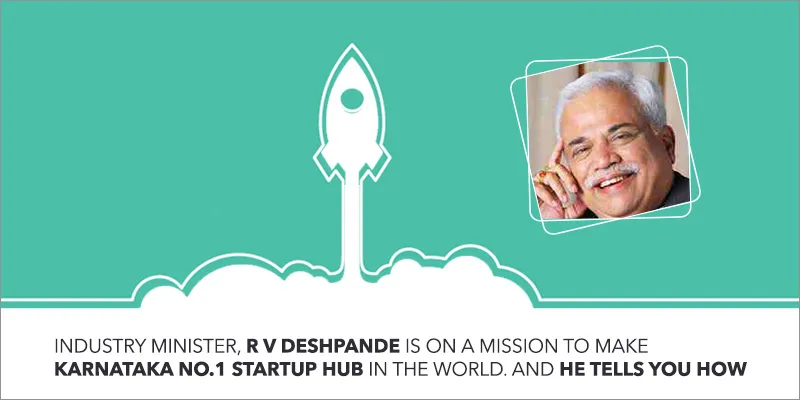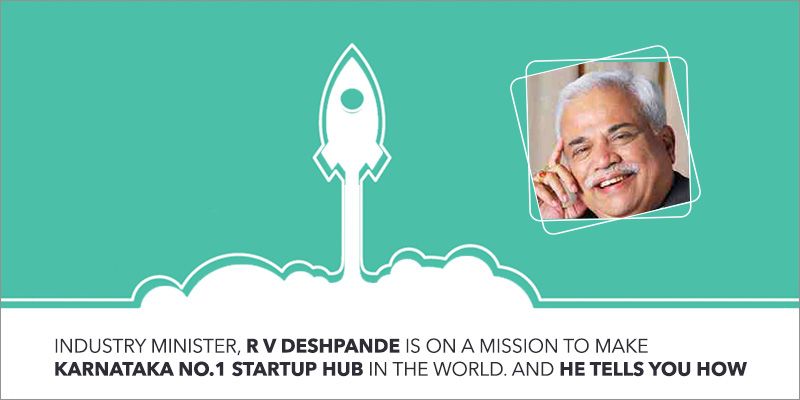Industry Minister R V Deshpande is on a mission to make Karnataka No.1 startup hub in the world. And he tells you how
When you meet Karnataka’s new Industries Minister, R V Deshpande, you can’t help but notice that he is very much like a startup guy, ready for action.
Deshpande landed the job a little less than three months ago and seems settled in already, working on a string of initiatives. Not surprising, given that it’s a position he’s already held under two previous governments and three different chief ministers over 1994-2004.

In his third innings in a role he knows only too well, Deshpande is putting together a Startup Council for Karnataka, and wants to ensure the state has a clear policy for startups in place very soon.
Bengaluru may have missed becoming a Smart City, but Deshpande is vociferous about his intentions to make sure that the city – and the state – don’t just maintain but also improve their rankings as the best place to be based out of for startups and entrepreneurs.
The word startup may be a new one, but it (the concept) has been around for a long time. We (the state government) launched the Karnataka Information Technology Venture Capital Fund (Kitven) Fund in 1999, when nobody was talking about venture capital and startups, to help new companies, he points out.
“Today, people talk about ease of doing business. That too is something we proactively tackled back in 2002,” he adds.
Deshpande is referring to the Karnataka Industries (Facilitation) Act of 2002. Earlier, in 1997, he worked with several business leaders, including prominent leader T. V. Mohandas Pai, to create an IT policy – the first Indian state to do so – and set up an IT department at the state government level. The setup helped attract some of the biggest names in IT, and later in biotechnology (BT), to Karnataka, making it the IT/BT powerhouse it is today.
The Minister happily admits he didn’t know how to use a computer back then; what he did know is that the government had to act as a facilitator and provide the right amount of support for the initiative to succeed. And it did. He now wants to replicate that impetus for startups.
Bengaluru is already home to the world’s second-fastest-growing startup ecosystem as well as the youngest entrepreneurs (with an average age of 28.5 years, versus Silicon Valley’s 36.2 years). It’s also the only Asian city in the top 20 (at #15), apart from Singapore. The Nasscom Startup Report of 2015 ranked India third in the world in terms of a startup ecosystem, with over 4,200 startups in the country.
“Karnataka has always been a leader in technological innovation. The big brand R&D centres are all here. We have a big, solid foundation and we don’t want to lose that advantage,” he admits. “And we have that advantage because government and industry worked together. Similarly, the Startup Council will also be driven by the industry. My vision is to create a world-class startup ecosystem here in Karnataka by providing the right strategy and government intervention where it’s needed.”
In terms of financial backing, Kitven has a second fund of Rs 27 crore (the first one, a Rs 15 crore-fund, liquidated its investments and returned the corpus to investors, with profits) focuses on knowledge industries in Karnataka.
Desphande also wants to partner with and leverage social media to attract startups to incubators and startup warehouses. Ask him why he’s so keen on seeing startups succeed and he tells you it’s because most entrepreneurs these days are youngsters. “They are our biggest asset. We have to guide them, help them, motivate them and make them great leaders,” he says.
India has the largest population of youth in the world, according to a UN study – over 350 million people between the ages of 10 and 24. Most, he says, come from a middle-class background with no prior experience of setting up and running a business. He’d like to catch them even younger, in college, and says that the policy will cover a network of colleges too, so that ideas can be incubated and nurtured.
Deshpande may not be entrepreneur himself – he was a lawyer by profession before he entered politics, and it is reflected in the way he advocates the cause of startups – but he understands the importance of creating wealth.
“We need to ensure economic prosperity and create wealth,” he says passionately, “and not just in Bangalore, but in the state, everywhere.” The government also wants to expand this to cities like Hubbali, Mysuru, Mangaluru and Belagavi, among others.
The plan is certainly ambitious and there is no guarantee of success. Deshpande is unfazed by the prospect. “There is so much one can learn from both failure and success. And if that’s your attitude, to learn from both, then that attitude itself will ensure your success,” he declares.
Do you have questions for the industry minister? Ask them in the comments section below.











![[Exclusive] Vauld to seek 3-month moratorium extension as creditors panel explores bailout options](https://images.yourstory.com/cs/2/a09f22505c6411ea9c48a10bad99c62f/VauldStoryCover-01-1667408888809.jpg)